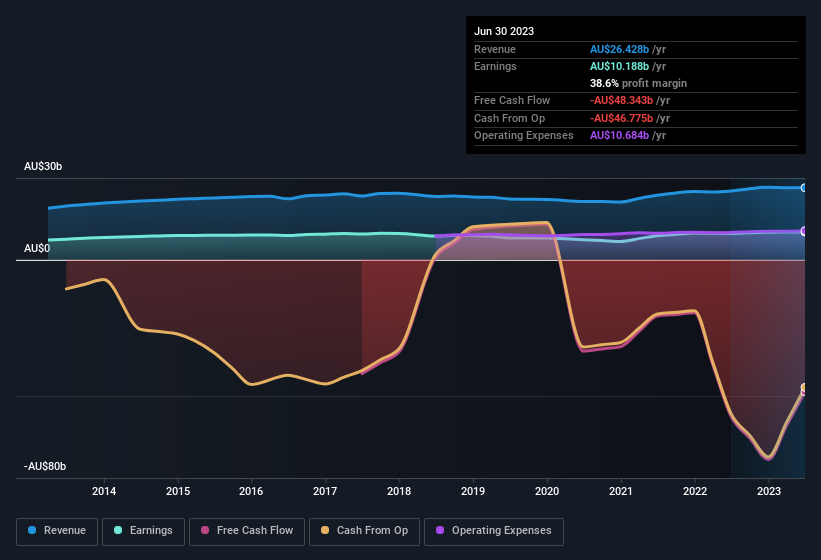Here's Why Commonwealth Bank of Australia (ASX:CBA) Has Caught The Eye Of Investors
For beginners, it can seem like a good idea (and an exciting prospect) to buy a company that tells a good story to investors, even if it currently lacks a track record of revenue and profit. But the reality is that when a company loses money each year, for long enough, its investors will usually take their share of those losses. Loss-making companies are always racing against time to reach financial sustainability, so investors in these companies may be taking on more risk than they should.
Despite being in the age of tech-stock blue-sky investing, many investors still adopt a more traditional strategy; buying shares in profitable companies like Commonwealth Bank of Australia (ASX:CBA). Even if this company is fairly valued by the market, investors would agree that generating consistent profits will continue to provide Commonwealth Bank of Australia with the means to add long-term value to shareholders.
View our latest analysis for Commonwealth Bank of Australia
How Quickly Is Commonwealth Bank of Australia Increasing Earnings Per Share?
If a company can keep growing earnings per share (EPS) long enough, its share price should eventually follow. That makes EPS growth an attractive quality for any company. We can see that in the last three years Commonwealth Bank of Australia grew its EPS by 13% per year. That growth rate is fairly good, assuming the company can keep it up.
Top-line growth is a great indicator that growth is sustainable, and combined with a high earnings before interest and taxation (EBIT) margin, it's a great way for a company to maintain a competitive advantage in the market. Not all of Commonwealth Bank of Australia's revenue this year is revenue from operations, so keep in mind the revenue and margin numbers used in this article might not be the best representation of the underlying business. While we note Commonwealth Bank of Australia achieved similar EBIT margins to last year, revenue grew by a solid 4.8% to AU$26b. That's progress.
In the chart below, you can see how the company has grown earnings and revenue, over time. Click on the chart to see the exact numbers.

Of course the knack is to find stocks that have their best days in the future, not in the past. You could base your opinion on past performance, of course, but you may also want to check this interactive graph of professional analyst EPS forecasts for Commonwealth Bank of Australia.
Are Commonwealth Bank of Australia Insiders Aligned With All Shareholders?
Since Commonwealth Bank of Australia has a market capitalisation of AU$189b, we wouldn't expect insiders to hold a large percentage of shares. But we are reassured by the fact they have invested in the company. We note that their impressive stake in the company is worth AU$355m. While that is a lot of skin in the game, we note this holding only totals to 0.2% of the business, which is a result of the company being so large. This still shows shareholders there is a degree of alignment between management and themselves.
Should You Add Commonwealth Bank of Australia To Your Watchlist?
One positive for Commonwealth Bank of Australia is that it is growing EPS. That's nice to see. If that's not enough on its own, there is also the rather notable levels of insider ownership. These two factors are a huge highlight for the company which should be a strong contender your watchlists. We should say that we've discovered 1 warning sign for Commonwealth Bank of Australia that you should be aware of before investing here.
Although Commonwealth Bank of Australia certainly looks good, it may appeal to more investors if insiders were buying up shares. If you like to see companies with insider buying, then check out this handpicked selection of Australian companies that not only boast of strong growth but have also seen recent insider buying..
Please note the insider transactions discussed in this article refer to reportable transactions in the relevant jurisdiction.
Have feedback on this article? Concerned about the content? Get in touch with us directly. Alternatively, email editorial-team (at) simplywallst.com.
This article by Simply Wall St is general in nature. We provide commentary based on historical data and analyst forecasts only using an unbiased methodology and our articles are not intended to be financial advice. It does not constitute a recommendation to buy or sell any stock, and does not take account of your objectives, or your financial situation. We aim to bring you long-term focused analysis driven by fundamental data. Note that our analysis may not factor in the latest price-sensitive company announcements or qualitative material. Simply Wall St has no position in any stocks mentioned.
